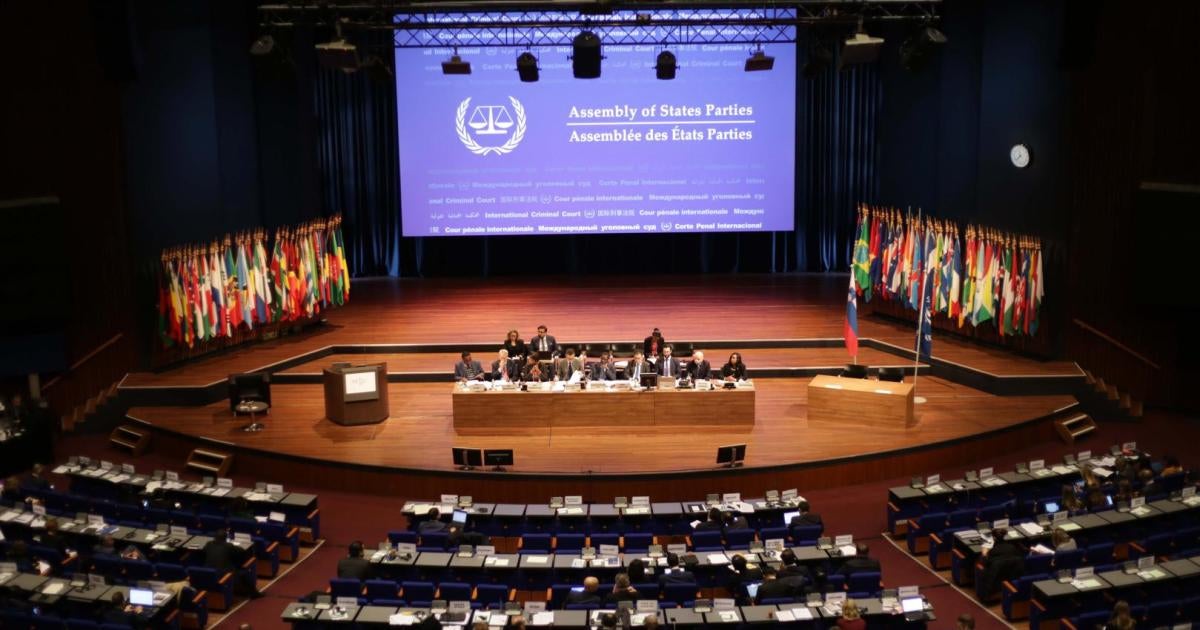Canada Should Put Its Money Where Its Mouth Is

International Criminal Court member countries will meet in the Hague next week starting December 5th at a time of renewed attention on the crucial role of the court in justice and accountability for serious international crimes. Russia’s full-scale invasion of Ukraine in late February and the litany of apparent war crimes will no doubt be on everyone’s minds at the Assembly of States Parties session. In many ways, the international community’s unprecedented response to this conflict was a tipping point, with countries individually and collectively activating an extensive range of accountability mechanisms at lightning speed. Within a matter of weeks, the ICC prosecutor opened an investigation in Ukraine following a referral by a record number of countries, underscoring what can be achieved with an ample dose of political will and moral courage. Canada has been at the forefront of many of these efforts, using virtually every tool at the government’s disposal to deliver justice for victims of grave international crimes. In addition to joining in referring Ukraine to the ICC, Canada imposed a series of targeted sanctions on more than 1,000 individuals and entities complicit in human rights abuses. In May, following a request by the ICC prosecutor, Canada also announced a voluntary contribution of CDN$1 million and the deployment of a team of Canadian investigators to support the prosecutor’s work. Despite the messaging that linked these contributions to Ukraine, raising unfortunate perceptions of politicization in the court’s work, these funds cannot be earmarked and should be used across all investigations on the prosecutor’s docket. But, while these contributions signal a strong commitment to justice, they also serve as an acknowledgment by Canada that the court does not have the resources to fulfill its mandate. Court officials were raising this concern long before the Ukraine conflict. In its announcement of renewed support to the ICC, the Trudeau government stated unequivocally that “Canada recognizes that justice requires resources.” At the upcoming Assembly session, Canada should reaffirm this important message publicly and commit to ensuring that the court has the resources it needs to carry out its mandate effectively and consistently across all situations under its jurisdiction.
The best way to do this is not through unsustainable and politically tinged ad hoc voluntary contributions, but rather consistent support to align the court’s annual budget with its workload. Several ICC member countries, including Canada, have generally been reluctant to address a growing gap in the resources available to the court even when it was clear that its budget would limit victims’ access to justice.
The consequences of this failure have been felt deeply by victims and justice advocates. Take Nigeria, for example, where grave crimes by Boko Haram were under preliminary examination by the ICC for a decade. While in December 2020 the court’s then prosecutor determined that an investigation was warranted given inadequate domestic efforts to deliver justice, she forestalled action to open an investigation citing inadequate resources and operational challenges due to the Covid-19 pandemic. Reflecting on this decision, Chino Obiagwu, chair of the Nigerian Coalition for the International Criminal Court, said “the consequence is that victims had hopes raised and then those hopes were dashed... this reflects a failure of justice both at the domestic level and the international level.” Ultimately, ongoing resource constraints that stem from years of underfunding severely affect the court’s delivery of justice, not just in Nigeria, but also across all countries on the court’s docket. As a court of last resort, the ICC is often the only available avenue for justice for victims of the most serious crimes. At the upcoming session of the Assembly of States Parties, Canada should lead by example.
The government should highlight the need to ensure equal access to justice to victims across and within all ICC situations and express a willingness to consider this year, and in coming years, an investment in the court’s regular budget necessary to realize this goal. Canada should change the terms of this debate away from a race to hold down the bottom line to the need for longer-term planning and the court’s sustainability. Canada should back up its stated commitments to justice with the resources the court needs to do its job. Canada and other justice-supporting countries can send the strongest possible signal of support for the ICC, its global mandate, and the right of victims of serious crimes to access justice, by strengthening the court’s budget to ensure that all the court’s organs can accomplish their critical work. This concrete step would demonstrate that justice for grave international crimes is truly a priority for Canada, regardless of where abuses are committed and by whom.
Read the full article at the original website
References:
- https://nam02.safelinks.protection.outlook.com/?url=https%3A%2F%2Fwww.hrw.org%2Fnews%2F2022%2F02%2F23%2Frussia-ukraine-international-law-occupation-armed-conflict-and-human-rights&data=05%7C01%7Cdeiff%40hrw.org%7C63e41736d3f447e2df9208dad2203c61%7C2eb79de4d8044273a6e64b3188855f66%7C0%7C0%7C638053333317662835%7CUnknown%7CTWFpbGZsb3d8eyJWIjoiMC4wLjAwMDAiLCJQIjoiV2luMzIiLCJBTiI6Ik1haWwiLCJXVCI6Mn0%3D%7C3000%7C%7C%7C&sdata=hIhfhQqLcE9R8EK%2BRyPquml3ey78x7J4en2MoAzZpmg%3D&reserved=0
- https://nam02.safelinks.protection.outlook.com/?url=https%3A%2F%2Fwww.icc-cpi.int%2Fukraine&data=05%7C01%7Cdeiff%40hrw.org%7C63e41736d3f447e2df9208dad2203c61%7C2eb79de4d8044273a6e64b3188855f66%7C0%7C0%7C638053333317662835%7CUnknown%7CTWFpbGZsb3d8eyJWIjoiMC4wLjAwMDAiLCJQIjoiV2luMzIiLCJBTiI6Ik1haWwiLCJXVCI6Mn0%3D%7C3000%7C%7C%7C&sdata=pbIhI68Lg%2BKlFvqNlj%2FGAjyqMQ3S10YXg%2FcNM9sY9TU%3D&reserved=0
- https://nam02.safelinks.protection.outlook.com/?url=https%3A%2F%2Fwww.canada.ca%2Fen%2Fglobal-affairs%2Fnews%2F2022%2F07%2Fminister-joly-announces-canadas-intent-to-further-sanction-key-russian-economic-sectors.html&data=05%7C01%7Cdeiff%40hrw.org%7C63e41736d3f447e2df9208dad2203c61%7C2eb79de4d8044273a6e64b3188855f66%7C0%7C0%7C638053333317662835%7CUnknown%7CTWFpbGZsb3d8eyJWIjoiMC4wLjAwMDAiLCJQIjoiV2luMzIiLCJBTiI6Ik1haWwiLCJXVCI6Mn0%3D%7C3000%7C%7C%7C&sdata=w3Yb1f3KXDY663qRYr0OiQiXHSNWDgEIVLRAoqdRVcE%3D&reserved=0
- https://nam02.safelinks.protection.outlook.com/?url=https%3A%2F%2Fwww.canada.ca%2Fen%2Fglobal-affairs%2Fnews%2F2022%2F05%2Fcanada-provides-funding-to-international-criminal-court-to-strengthen-accountability-for-conflict-related-sexual-violence.html&data=05%7C01%7Cdeiff%40hrw.org%7C63e41736d3f447e2df9208dad2203c61%7C2eb79de4d8044273a6e64b3188855f66%7C0%7C0%7C638053333317662835%7CUnknown%7CTWFpbGZsb3d8eyJWIjoiMC4wLjAwMDAiLCJQIjoiV2luMzIiLCJBTiI6Ik1haWwiLCJXVCI6Mn0%3D%7C3000%7C%7C%7C&sdata=S90zk2omLVTxjsH9MORXFQh79lP4ON3M2eo5TQ5BzmQ%3D&reserved=0
- https://nam02.safelinks.protection.outlook.com/?url=https%3A%2F%2Fwww.theglobeandmail.com%2Fpolitics%2Farticle-russia-ukraine-war-crimes-investigation%2F&data=05%7C01%7Cdeiff%40hrw.org%7C63e41736d3f447e2df9208dad2203c61%7C2eb79de4d8044273a6e64b3188855f66%7C0%7C0%7C638053333317662835%7CUnknown%7CTWFpbGZsb3d8eyJWIjoiMC4wLjAwMDAiLCJQIjoiV2luMzIiLCJBTiI6Ik1haWwiLCJXVCI6Mn0%3D%7C3000%7C%7C%7C&sdata=LSR%2FCWwUtsaTXMIz187ZTHN0k73qcAl%2BSXPez8dzNzg%3D&reserved=0
- https://nam02.safelinks.protection.outlook.com/?url=https%3A%2F%2Fwww.coalitionfortheicc.org%2F&data=05%7C01%7Cdeiff%40hrw.org%7C63e41736d3f447e2df9208dad2203c61%7C2eb79de4d8044273a6e64b3188855f66%7C0%7C0%7C638053333317662835%7CUnknown%7CTWFpbGZsb3d8eyJWIjoiMC4wLjAwMDAiLCJQIjoiV2luMzIiLCJBTiI6Ik1haWwiLCJXVCI6Mn0%3D%7C3000%7C%7C%7C&sdata=7htNuRFsq4w%2B5vKd824zsF%2FO4fT9TiPg11EIZGJZBv8%3D&reserved=0
- https://nam02.safelinks.protection.outlook.com/?url=https%3A%2F%2Fwww.icc-cpi.int%2Fsites%2Fdefault%2Ffiles%2FitemsDocuments%2F20210615-prosecutor-fatou-bensouda-end-of-term-farewell-statement.pdf&data=05%7C01%7Cdeiff%40hrw.org%7C63e41736d3f447e2df9208dad2203c61%7C2eb79de4d8044273a6e64b3188855f66%7C0%7C0%7C638053333317662835%7CUnknown%7CTWFpbGZsb3d8eyJWIjoiMC4wLjAwMDAiLCJQIjoiV2luMzIiLCJBTiI6Ik1haWwiLCJXVCI6Mn0%3D%7C3000%7C%7C%7C&sdata=vozsRqhqidGhwugioYnzDTDeiTQ8c3SJ7Xv7x%2FRgqBA%3D&reserved=0
- https://nam02.safelinks.protection.outlook.com/?url=https%3A%2F%2Fwww.icc-cpi.int%2Fnews%2Fstatement-prosecutor-fatou-bensouda-conclusion-preliminary-examination-situation-nigeria&data=05%7C01%7Cdeiff%40hrw.org%7C63e41736d3f447e2df9208dad2203c61%7C2eb79de4d8044273a6e64b3188855f66%7C0%7C0%7C638053333317662835%7CUnknown%7CTWFpbGZsb3d8eyJWIjoiMC4wLjAwMDAiLCJQIjoiV2luMzIiLCJBTiI6Ik1haWwiLCJXVCI6Mn0%3D%7C3000%7C%7C%7C&sdata=stf1pmg7iKRO1BWTR6h8wDyOpXB1F6xL5DIf%2Bd75ES8%3D&reserved=0
- https://nam02.safelinks.protection.outlook.com/?url=https%3A%2F%2Fwww.hrw.org%2Fvideo-photos%2Faudio%2F2022%2F07%2F18%2Finternational-criminal-justice-day-2022-what-now&data=05%7C01%7Cdeiff%40hrw.org%7C63e41736d3f447e2df9208dad2203c61%7C2eb79de4d8044273a6e64b3188855f66%7C0%7C0%7C638053333317662835%7CUnknown%7CTWFpbGZsb3d8eyJWIjoiMC4wLjAwMDAiLCJQIjoiV2luMzIiLCJBTiI6Ik1haWwiLCJXVCI6Mn0%3D%7C3000%7C%7C%7C&sdata=ratJnjUr4pZC3VyeKcP%2F0xpZ3%2BbrMkk0ghVKjgcK2EM%3D&reserved=0
